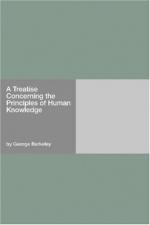142. After what has been said, it is, I suppose, plain that our souls are not to be known in the same manner as senseless, inactive objects, or by way of idea. Spirits and ideas are things so wholly different, that when we say “they exist,” “they are known,” or the like, these words must not be thought to signify anything common to both natures. There is nothing alike or common in them: and to expect that by any multiplication or enlargement of our faculties we may be enabled to know a spirit as we do a triangle, seems as absurd as if we should hope to see a sound. This is inculcated because I imagine it may be of moment towards clearing several important questions, and preventing some very dangerous errors concerning the nature of the soul. We may not, I think, strictly be said to have an idea of an active being, or of an action, although we may be said to have a notion of them. I have some knowledge or notion of my mind, and its acts about ideas, inasmuch as I know or understand what is meant by these words. What I know, that I have some notion of. I will not say that the terms idea and notion may not be used convertibly, if the world will have it so; but yet it conduceth to clearness and propriety that we distinguish things very different by different names. It is also to be remarked that, all relations including an act of the mind, we cannot so properly be said to have an idea, but rather a notion of the relations and habitudes between things. But if, in the modern way, the word idea is extended to spirits, and relations, and acts, this is, after all, an affair of verbal concern.
143. It will not be amiss to add, that the doctrine of abstract ideas has had no small share in rendering those sciences intricate and obscure which are particularly conversant about spiritual things. Men have imagined they could frame abstract notions of the powers and acts of the mind, and consider them prescinded as well from the mind or spirit itself, as from their respective objects and effects. Hence a great number of dark and ambiguous terms, presumed to stand for abstract notions, have been introduced into metaphysics and morality, and from these have grown infinite distractions and disputes amongst the learned.
144. But, nothing seems more to have contributed towards engaging men in controversies and mistakes with regard to the nature and operations of the mind, than the being used to speak of those things in terms borrowed from sensible ideas. For example, the will is termed the motion of the soul; this infuses a belief that the mind of man is as a ball in motion, impelled and determined by the objects of sense, as necessarily as that is by the stroke of a racket. Hence arise endless scruples and errors of dangerous consequence in morality. All which, I doubt not, may be cleared, and truth appear plain, uniform, and consistent, could but philosophers be prevailed on to retire into themselves, and attentively consider their own meaning.




